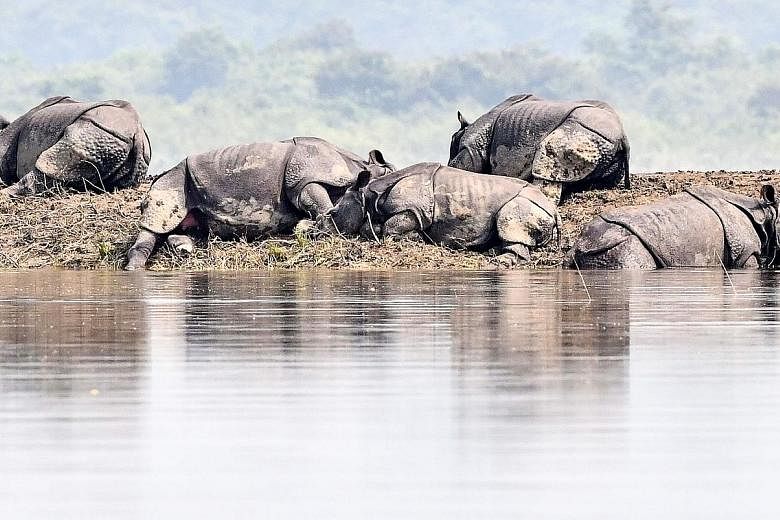GUWAHATI (India) • Wildlife officers are racing against time to rescue animals caught in floodwaters after torrential monsoon rains in India's famed Kaziranga National Park, with the death toll rising to 215.
Most of the Unesco World Heritage-listed park - home to two-thirds of the world's remaining one-horned rhinos - in the north-eastern Indian state of Assam was submerged by heavy rain.
While some animals were able to survive by fleeing to higher ground, 215 wild creatures - including 19 rhinos and 129 hog deer - have died so far, officials said.
The floods have started to ease in some areas, but forestry officials and rescuers from the Wildlife Trust of India continue to find distressed animals trapped in the floodwaters.
In one instance, a rhino calf was pulled onto a rescue speedboat and taken to a rehabilitation centre, where it was checked by a vet.
"We rescued a rhino calf which is about two months old... She is very weak," the Centre for Wildlife Rehabilitation and Conservation's senior veterinarian Panjit Basumatary said.
"The flood this year has been massive and we found several distressed wild animals, especially in the fringe areas (of the park)." Dr Basumatary said he was hopeful that most of the animals could be released back into the wild after they receive treatment at the centre.
Meanwhile, some 200 reindeer have been found dead from starvation in the Arctic archipelago Svalbard, an unusually high number, the Norwegian Polar Institute said on Monday, pointing the finger at climate change.
During their annual census of the wild reindeer population on the group of islands in the Arctic Ocean, about 1,200km from the North Pole, three researchers from the institute identified around 200 carcasses of deer believed to have starved to death last winter.
Ms Ashild Onvik Pedersen, head of the census, said the "high degree of mortality" was a consequence of climate change, which according to climate scientists is happening twice as fast in the Arctic as the rest of the world.
"Climate change is making it rain much more. The rain falls on the snow and forms a layer of ice on the tundra, making grazing conditions very poor for animals," she said.
In winter, Svalbard reindeer find vegetation in the snow using their hooves, but alternating freezing and thawing periods can create layers of impenetrable ice, depriving the reindeer of nourishment.
According to Ms Onvik Pedersen, a comparable death toll has been recorded only once before - after the winter of 2007-2008 - since monitoring of the reindeer population started 40 years ago.
The increased mortality is also due in part to a significant increase in the number of reindeer in the Norwegian archipelago. That is partly thanks to climate change and the warmer summers, meaning more individuals compete in the same grazing areas.
AGENCE FRANCE-PRESSE

